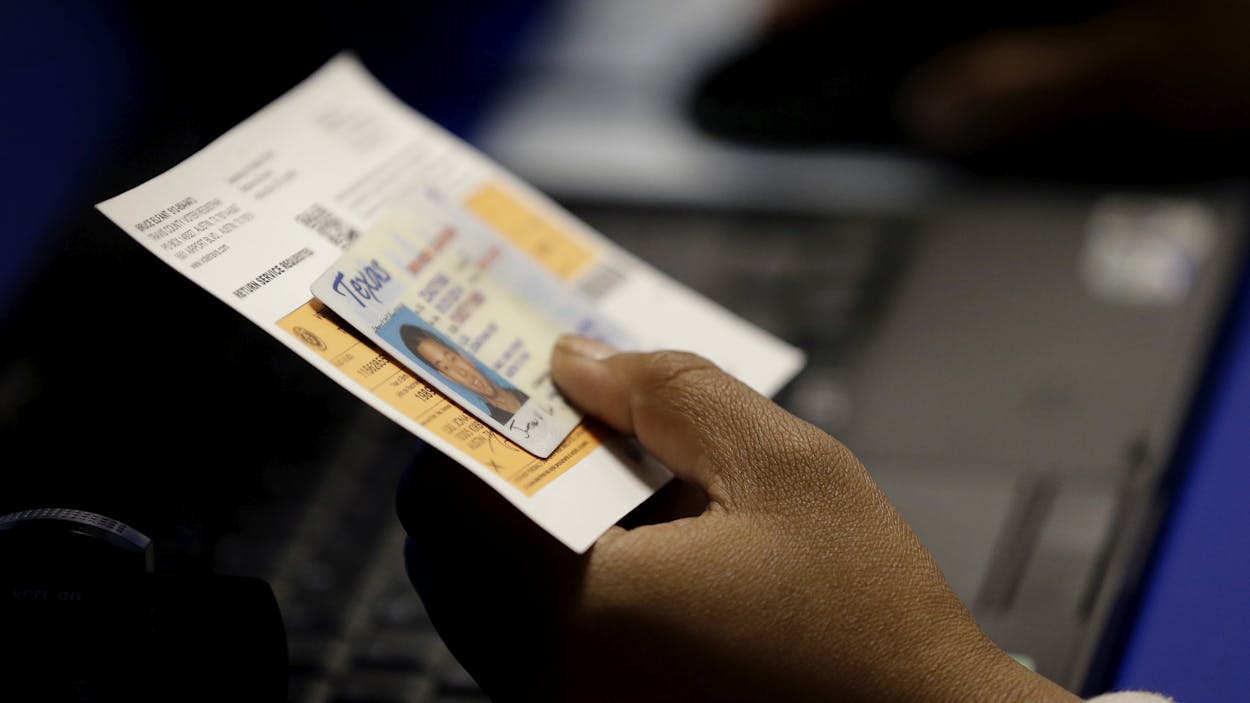Lyndon B. Johnson signed the Voting Rights Act into law fifty years ago Thursday, and it’s still lauded as a landmark piece of legislation central to the Civil Rights movement. But Wednesday, a day short of its anniversary, the Fifth U.S. Circuit Court of Appeals ruled that Texas’s voter registration policy was in violation of the law.
That probably won’t end the fight on either side. But it’s significant in establishing the reach of the Voting Rights Act in 2015, and advocates on both sides of the issue are praising it for different reasons.
How does the Voting Rights Act apply to voting in Texas today?
Many say that voter registration in some states — mostly noting photo ID requirements — are an unconstitutional burden on certain parts of the population. In the five decades since the Voting Rights Act went into effect, Supreme Court decisions and federal legislation have challenged sections of the law, bringing into question the meaning of discrimination and appropriate means of the law’s enforcement. No one is outright denying that discrimination at the polls is wrong, but lawmakers, politicians, and pundits have long argued about what, exactly, constitutes discrimination.
Enter Texas’s voter ID law, one of the strictest of its kind in the country. Passed in 2011, the law requires photo identification for registration with limited exceptions. Accepted forms of ID include a DPS driver licence, DPS photo identification card, a United States passport, a concealed handgun license, among others.
What problems do people have with Texas’s voter ID law?
Proponents generally argue that it guards against voter fraud, saying that obtaining a valid, approved photo ID is not a barrier for people who want to vote. Opponents, however, say it had an adverse effect on eligible voters in Texas who are less likely to possess those forms of ID, namely minorities.
After the law passed, the U.S. Department of Justice determined it was discriminatory, stating that the approved forms of identification were sometimes too difficult for minority voters to obtain.
In 2013, the Supreme Court struck down part of the Voting Rights Act that required states with histories of discrimination to seek federal approval before instituting voter registration legislation. This enabled Texas to implement its voter ID law without the federal government’s blessing.
This Supreme Court decision argued that part of the law was written during a time when discrimination was more prominent, and that in a modern context it was no longer necessary. Many liberals, including President Obama and Judge Ruth Bader Ginsberg, were deeply unhappy with the ruling, arguing that federal oversight was still necessary.
And that brings us to today. In 2014, U.S. District Judge Nelva Gonzales Ramos struck down the voter ID law, calling it an “unconstitutional poll tax,” and arguing that it created an burden for minority voters that was intentionally engineered to discriminate against Hispanic and African-American voters. At the time, the NAACP and other opponents of the law argued it had a disparate impact on as many as 600,000 Texas voters. As NAACP attorney Ryan P. Haygood told the Huffington Post:
The evidence in this case demonstrated that the law, like its poll tax ancestor, imposes real costs, and unjustified, disparate burdens on the voting rights of more than 600,000 registered Texas voters, a substantial percentage of whom are voters of color.
So, what exactly did the appeals court decide?
In reality, it’s not a full-on victory for either side.
The court first and foremost ruled that the law violated Section 2 of the Voting Rights Act, and that it was adversely affecting minorities’ ability to vote. The ruling, however, did not find that the restrictions were tantamount to a poll tax like the district court did. It also remanded the argument that the law had a discriminatory purpose, sending it back to the lower court to make that determination:
We remand this case for further consideration of the discriminatory purpose finding, vacate the poll tax finding, and uphold at this point only the district court’s discriminatory effect finding.
What’s next?
We’ll let the court speak for itself:
Clearly, the Legislature wished to reduce the risk of in-person voter fraud by strengthening the forms of identification presented for voting. Simply reverting to the system in place before SB 14’s passage would not fully respect these policy choices—it would allow voters to cast ballots after presenting less secure forms of identification like utility bills, bank statements, or paychecks.
Uh, what does that mean?
OK, the state does have the choice to appeal the decision to a higher court, and as of now, it’s unclear which way it will go.
State Attorney General Ken Paxton, a proponent of Texas’s voter ID law, was happy with the ruling: “I’m particularly pleased the panel saw through and rejected the plaintiffs’ claim that our law constituted a poll tax. The intent of this law is to protect the voting process in Texas, and we will continue to defend this important safeguard for all Texas voters,” he told the Associated Press.
As were Democrats such as Senator Rodney Ellis of Houston, who called on the state not to appeal the court’s decision, and argued the law impeded voter turnout in Texas: “Near last in the country in voter turnout, Texas should be working to get more folks to the polls — not to turn away legal, legitimate voters,” he told the Dallas Morning News.






